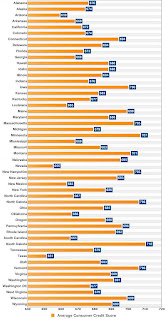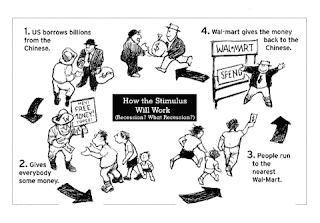Federal Reserve Predicts : In 2009 US Economy will Go Worst

Last week the Fed warned that the dull American economy will get even worse than the economists predicted. Fed expressed concern as there is no sign of improvement of housing market and its stabilization and predicted that it can even deteriorate in future.
According to The Federal Reserve estimate, in 2009 the unemployment rate could touch 8.8%. The Central Bank report also indicates the new home building and future project applications have touched record low in January. Some economists still hopeful for a better future.
The Federal Reserve forecasts that in 2009 the economy will shrink between 0.5 and 1.3%. Some days ago it predicted the contraction of 0.2% or expansion by 1.1%. In 1991 the US economy had been shrinked by 0.2% and remained for a year. According to FED premonition the economy is going to be on its weakest position since 1982 (1.9% contractions).
The dark forecast is showing the deep toll of the toughest financial crises. The country is facing the economic crisis for the consecutive year. The production of factories and mines has dipped 1.8% on January. The economists were expecting a fall in production but this has crossed their expectations too. The auto plants production have been down by 23% for the consecutive 3rd month. The construction sector has also been dropped by 16.8% from December 2008.
According to some economists the construction market is worst since 1930 and the situation is going to worsen day by day. Last week another boost came from Obama of $75 billion (to save 9 million citizens from loosing their home), this can also work for the housing sector.
According to The Federal Reserve estimate, in 2009 the unemployment rate could touch 8.8%. The Central Bank report also indicates the new home building and future project applications have touched record low in January. Some economists still hopeful for a better future.
The Federal Reserve forecasts that in 2009 the economy will shrink between 0.5 and 1.3%. Some days ago it predicted the contraction of 0.2% or expansion by 1.1%. In 1991 the US economy had been shrinked by 0.2% and remained for a year. According to FED premonition the economy is going to be on its weakest position since 1982 (1.9% contractions).
The dark forecast is showing the deep toll of the toughest financial crises. The country is facing the economic crisis for the consecutive year. The production of factories and mines has dipped 1.8% on January. The economists were expecting a fall in production but this has crossed their expectations too. The auto plants production have been down by 23% for the consecutive 3rd month. The construction sector has also been dropped by 16.8% from December 2008.
According to some economists the construction market is worst since 1930 and the situation is going to worsen day by day. Last week another boost came from Obama of $75 billion (to save 9 million citizens from loosing their home), this can also work for the housing sector.







